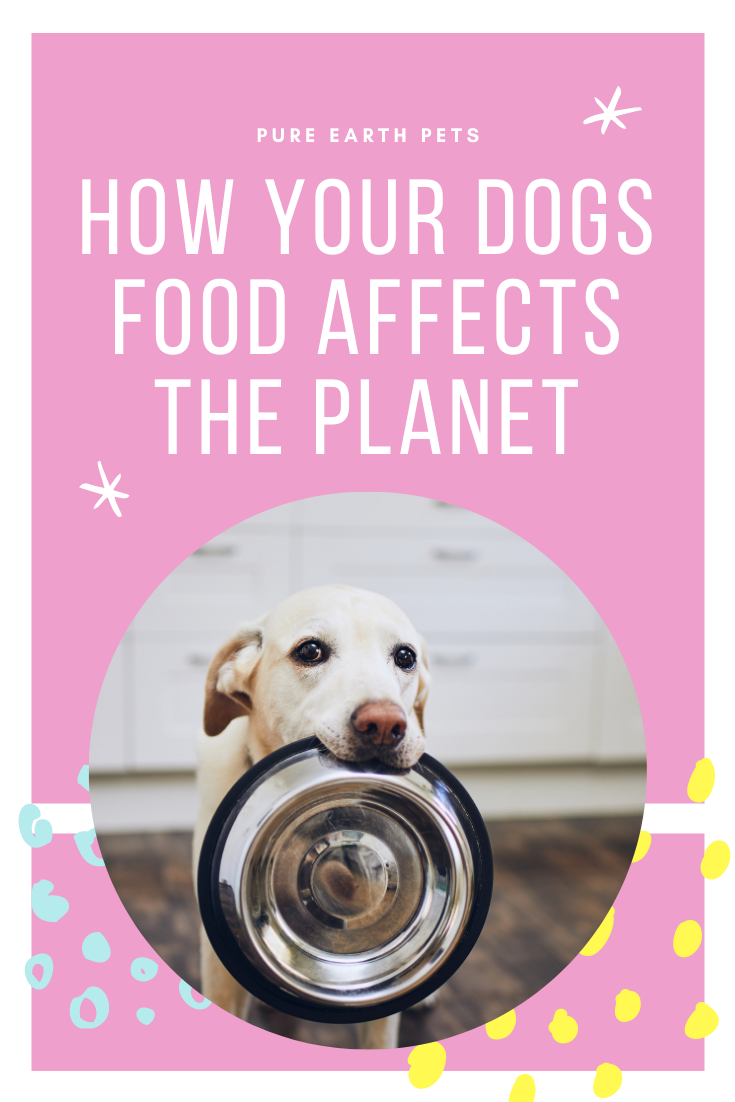
How Your Dog's Food Impacts The Earth
Share
How your dog's food impacts the Earth
As dog owners, it’s safe to say that we LOVE our furry best friends. And ultimately, we just want them to have the best life, right? So we usually cater to their every need, especially when it comes to their food.
Whether you buy your dog Michelin Star food brands, keep them on a strict doggy diet, or buy every new dog treat brand on the market, the food choices you make for your dog can be very impactful. And not just on your wallet!
This might come as a surprise to you, but the food our dogs eat - and the production, manufacturing, and distribution behind it - actually creates a pretty big ecological pawprint!
How Exactly Does A Dog’s Food Impact The Earth?
Meat Production
The meat that goes into kibble or dry pet food is estimated to be responsible for ¼ of the overall meat production’s environmental impact, according to a 2017 UCLA study. With over 77.8 million dogs in the US (as of 2015), our pups help contribute 30% of meat consumption’s total environmental impact.
That’s a lot of environmental impact from our precious pups!
We already know that the land, water, and food needed to feed cattle, sheep, poultry, pigs, and farmed fish has a huge ecological footprint. But we should also mention that the planet has fewer natural resources - like land and freshwater to graze and hydrate farmed animals - at our disposal for agriculture and food production.
Dry Food Production
In general, the quality of many dog foods on the market is low. Dry dog foods are often mixed with cheap corn feed fillers, chemical additives, and preservatives -- among many other “ingredients.” You probably don’t need us to tell you that those ingredients aren’t good for your dog or the environment they end up polluting.
Generic dog food brands also dump low-quality grade allergens such as corn, wheat, and soy to help bulk out or bind the dry food. Corn, in particular, is a highly problematic crop. Not only does corn need a tremendous amount of freshwater to grow, but it also needs way more fertilizer than other crops leading to depleted freshwater sources and fertilizer pollution in the soil and nearby waterways.
How Can We Reduce Our Dogs Environmental Impact?
Choose Locally Sourced Pet Foods
Like human food, choosing locally-produced pet products can decrease your carbon footprint, support local industry, and provide access to top-quality foods for your dog. Many local Co-ops sell local pet food brands and provide raw ingredients if you prefer to make your own dog food from scratch.
Consider Raw Food
We’re seeing a shift toward “humanizing” our pets by feeding them “natural, raw, and organic” foods. Interestingly enough, this food trend is shifting a dog’s diet back to raw meats. Studies suggest that raw meat diets are beneficial for dogs whose short intestinal tracts are better suited for consuming raw foods, among other reasons.
Considering that raw meat has a lower carbon footprint than processed meat, this trend could actually be a good one for your dog and the planet. Just remember that changing your dog’s diet needs to be a gradual process to reduce or alleviate any unpleasant side effects for your pup. Always consult a vet before shifting your dog to a raw food diet!
Feed Them Animal By-products
It’s important to remember that dog’s were originally scavengers -- meaning they ate what they could get their paws on. It wasn’t until English Electricion, James Spratt, came up with dog biscuits in 1860 (and later, canned dog food in 1922) that we started feeding our dogs anything else but raw meat and table scraps.
Unlike humans, dogs aren't fussy about which part of the animal they consume. Animal by-products are actually highly nutritious and a great way to reduce the footprint that meat production causes by using every part of the animal. Just remember to source organic, grass-fed, high-quality animal byproducts without hormones, antibiotics, or preservatives for your pups!
Choose Sustainable Dog Food Brands
Not only are you supporting sustainable and environmentally conscious brands through your purchases of dog foods and treats, but you are also keeping pesticides out of the soil and waterways. These brands make it their job to leave a positive - rather than negative - impact on the earth.
Don’t Fall For Pet Food Trends
It’s really important to pay attention to “pet food trends” that are getting popularized by the pet food industry rather than scientific evidence. For example, many pet brands claim that dogs shouldn’t eat grains. According to a study on starch-rich diets in dogs and wolves, dogs actually do well on diets that include grains.
In general, dogs do well on a well-balanced diet that includes grains, fruits, vegetables, and meat. So don’t let the $25 billion dollar pet industry sway your opinions with fancy marketing or trending fad diets.
Stop Overfeeding Your Dogs
One of the easiest ways to reduce the environmental impact for your dog is to stop overfeeding them! Obesity is a big problem for pets in the US with over 60% of dogs being classified as overweight. Not only does overfeeding lead to unhealthy pups, but it’s also a major contribution to the unstustainability of pet food production.
Like most environmental impacts, taking the necessary steps that we've outlined above can help decrease your doggy’s eco pawprint on the earth! Choose dog foods that are both nutritious for your pup AND good for the environment. We promise it’s possible.